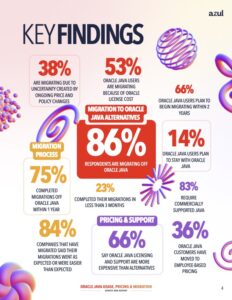
In January 2023, Oracle changed its Java licensing and/or pricing model for the fourth time in four years. Under the new pricing announced, Oracle Java customers pay based on the number of employees – including part-time workers and contractors – rather than the historical way of paying based on the number of processors running Java, servers, and the number of named users for desktops. How did Oracle Java customers, and the broader Java community, respond to these changes?
In the spring of 2024, Azul launched the first annual Oracle Java Usage, Pricing & Migration Survey and Report, soliciting feedback from current and former users of Oracle Java to assess the impact of the announced pricing changes and their plans, reasons behind, and overall experiences migrating to alternative JDKs.
The results are in, and three major themes emerged:
- Oracle Java customers are moving to alternatives based on OpenJDK primarily because of cost, preference for open source, and uncertainty
- Migration to an OpenJDK distribution is as expected or easier
- Java users value commercial support and expertise
Oracle Java Users are moving because of cost and uncertainty
86% of survey participants have moved completely off Oracle Java, are actively migrating to another Java provider, or plan to migrate to another Java distribution. Only 14% intend to continue using Oracle Java.

The critical factor is cost. When asked why they decided to migrate off Oracle Java, participants’ top three reasons were:
- Cost (53%)
- Preference for open source (47%)
- Uncertainty over Oracle’s ongoing pricing, licensing, and support changes (38%)
The Oracle Java migration is happening now and is expected to continue in the future. Roughly two-thirds of survey participants who plan to migrate off Oracle Java (but haven’t started yet) plan to start their migration within two years. And more than half of participants who are migrating off Oracle Java (or are planning to) expect to complete their migrations from Oracle Java to OpenJDK within two years.

Migration to OpenJDK is as expected or easier
Given the importance of cost, you might wonder why more companies aren’t migrating off Oracle Java. As it turns out, many Oracle Java users think the migration process is just too daunting.
31% consider migrating to be too risky, 28% are afraid they won’t be able to migrate completely off Oracle and will still have to pay them, and 22% believe they lack the resources to migrate to an OpenJDK distribution successfully. In all, that’s about half of those 14% of participants who are choosing to stay with Oracle Java.
Responses from participants who have already migrated completely off Oracle Java appear to allay these fears. In fact, 84% of participants who have completed migrating off Oracle Java said their migration went as expected or was easier than they expected. In addition, 75% completed their migrations within one year, and 23% finished in three months or less.

Java users value commercial support and expertise
Two-thirds of organizations that made the switch from Oracle Java to OpenJDK distributions are saving compared to their Oracle support costs.
Java users, however, are looking for more than just cost savings. Other features they value in an OpenJDK distribution are technical expertise (61%), timely releases and fixes (54%), customer support (42%), stabilized security-only updates (40%), and migration expertise (39%). As users were getting technical expertise, timely releases and fixes, and stabilized security-only updates from Oracle, the survey suggests they don’t want to lose these when they migrate.

How Azul fits in the Java landscape
Cost – Azul customers typically pay 70% less in license and support fees versus Oracle for a drop-in replacement for a Java runtime (JDK/JVM) that is compliant and fully tested using Oracle’s Java Technology Compatibility Kit (TCK) suite of tests.
Migration expertise – We literally wrote the book on migrating to OpenJDK – OpenJDK Migration for Dummies, written by Azul Deputy CTO Simon Ritter. The book explains our proven three-phase methodology and details blueprints for a successful migration.
Customer support – Azul support boasts 100% customer satisfaction, including the world’s largest team of Java-only engineers other than Oracle, who average more than 20 years of experience.
This is a very interesting time for Java and users of the Java runtime. We expect users of Oracle Java will continue to move to alternatives based on OpenJDK. The pace of migrations will likely accelerate in the coming years, as more and more realize the straightforward nature of migration and benefit from the tremendous cost savings and the quality of commercial support received from vendors in the OpenJDK community.
How we fielded the survey
We surveyed 663 respondents from companies of all sizes, across six continents. All participants are versed in Java – 75% said a substantial part of their jobs involve Java and 16% manage teams that have responsibility for Java application development or operations. We captured participants of all stripes – nearly half were director level or above, and 16% were individual contributors. Key findings center on Java migration numbers, the Java migration process, and Java pricing and support.
Survey Report
More from the study of Oracle Java users.





